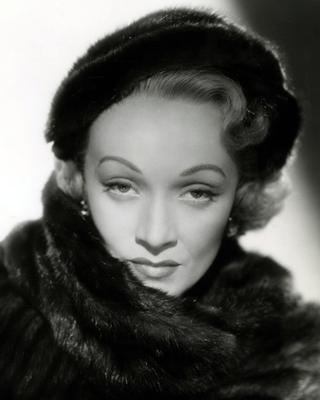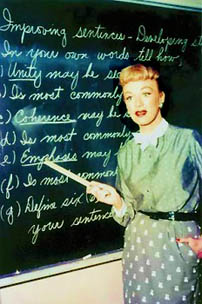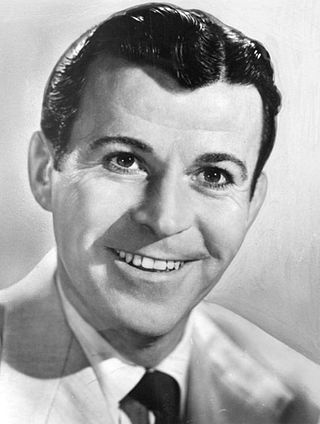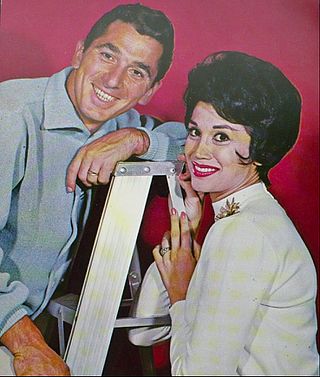
Eve Arden was an American film, radio, stage and television actress. She performed in leading and supporting roles for nearly six decades.

Marie Magdalene "Marlene" Dietrich was a German and American actress and singer whose career spanned from the 1910s to the 1980s.

June Foray was an American voice actress and radio personality, best known as the voice of such animated characters as Rocky the Flying Squirrel, Natasha Fatale, Nell Fenwick, Lucifer from Disney's Cinderella, Cindy Lou Who, Jokey Smurf, Granny from the Warner Bros. cartoons directed by Friz Freleng, Grammi Gummi from Disney's Adventures of the Gummi Bears series, and Magica De Spell, among many others.

Agnes Robertson Moorehead was an American actress. In a career spanning five decades, her credits included work in radio, stage, film, and television. Moorehead was the recipient of such accolades as a Primetime Emmy Award and two Golden Globe Awards, in addition to nominations for four Academy Awards.

Beatrice Benaderet was an American actress and comedienne. Born in New York City and raised in San Francisco, she began performing in Bay Area theatre and radio before embarking on a Hollywood career that spanned over three decades. Benaderet first specialized in voice-over work in the golden age of radio, appearing on numerous programs while working with comedians of the era such as Jack Benny, Burns and Allen, and Lucille Ball. Her expertise in dialect and characterization led to her becoming Warner Bros.' leading voice of female characters in their animated cartoons of the early 1940s through the mid-1950s.

Our Miss Brooks is an American sitcom starring Eve Arden as a sardonic high-school English teacher. It began as a radio show broadcast on CBS from 1948 to 1957. When the show was adapted to television (1952–56), it became one of the medium's earliest hits. In 1956, the sitcom was adapted for the big screen in the film of the same name.

Jane Ace was the high-voiced, malaprop-mastering wife on the legendary, low-keyed American radio comedy Easy Aces (1930–45). Playing herself opposite her real-life husband and the show's creator-writer, Goodman Ace (1899–1982), she delivered clever malapropisms over the air in each episode of the urbane serial comedy, and many became part of the American vernacular.

Dennis Day was an American actor, comedian and singer. He was of Irish descent.

Ilona Massey was a Hungarian-American film, stage and radio performer.
The year 1952 saw a number of significant happenings in radio broadcasting history.

Ding Dong School, billed as "the nursery school of the air", is a half-hour children's TV show which began on WNBQ-TV in Chicago, Illinois a few months before its four-year run on NBC. It is the earliest known preschool series to be produced in the United States, predating Romper Room by a year.

An Evening With Marlene Dietrich is a concert-format television special, starring Marlene Dietrich, first broadcast in 1973.

Nancy Gates was an American film and television actress.
Everybody Comes to Rick's is an American play that was bought unproduced by Warner Brothers for a record figure of $20,000. It was adapted for film as Casablanca (1942), starring Humphrey Bogart and Ingrid Bergman. Written by Murray Burnett and Joan Alison in 1940, prior to the United States' entry into World War II, the play was anti-Nazi and pro-French Resistance. The film became an American classic, highly successful and ranked by many as one of the greatest films ever made.

Sandra Jacqueline Denton, better known by her stage name Pepa or Pep, is a Jamaican-American rapper, best known for her work as a member of the female rap trio Salt-N-Pepa. Denton starred in The Salt-N-Pepa Show, a reality TV series focusing on reforming the group which aired on the VH1 network in 2008. Since January 2016, Denton has appeared as a supporting cast member on the music reality television show Growing Up Hip Hop which airs on We TV.
"The Boys in the Back Room" is a song written by Frank Loesser, set to music by Frederick Hollaender and performed by Marlene Dietrich in the film Destry Rides Again (1939). It is often referred to as "See What the Boys in the Back Room Will Have". Her winking performance was a parody of her vampish roles in earlier films such as The Blue Angel (1930) and Blonde Venus (1932). The song became a standard part of her repertoire, second only to "Lili Marlene". She also sang a German version called "Gib doch den Männern am Stammtisch ihr Gift".

Benno Vigny was a French-German screenwriter, novelist, songwriter, and librettist. Born into a Jewish family in France and raised in Vienna, Austria, Vigny's first significant work as a writer was the libretto for Robert Winterberg's operetta Fasching in Paris (1910). After serving in the French Army during World War I, he began a relationship with Marie-Louise Caussat, the mother of French songwriter Charles Trenet. She divorced her first husband in 1920, and married Vigny in 1922.

His Greatest Bluff is a 1927 German silent comedy film directed by Henrik Galeen and Harry Piel and starring Piel, Toni Tetzlaff and Lotte Lorring. Its title is sometimes translated as His Biggest Bluff. Today, the film is best known for the early role it offered to Marlene Dietrich who was only cast after great effort by her agents. The film was shot at the Grunewald Studios, located in Western Berlin, during January and February 1927. It premiered on 12 May 1927 at the Alhambra-Palast in Berlin.

Roberta Linn is an American singer and entertainer. From 1949 to 1954, she sang with the Lawrence Welk group. She was the Lawrence Welk Show first TV Champagne Lady. Linn is also closely associated with the Rat Pack and the Las Vegas Strip, where she was a regular solo performer beginning in 1955 at The New Frontier and then in 1961 with her husband Freddie Bell and the Bellboys at the Sahara Hotel. Linn continued performing in Las Vegas for 18 straight years at a variety of iconic hotels including the Stardust, Riviera, Dunes, Caesers, Desert Inn and the Sands at their Great American Songbook musical zenith in the 50s and 60s.

Time for Love is an old-time radio adventure drama in the United States. It was broadcast on CBS January 15, 1953 - May 27, 1954.

















